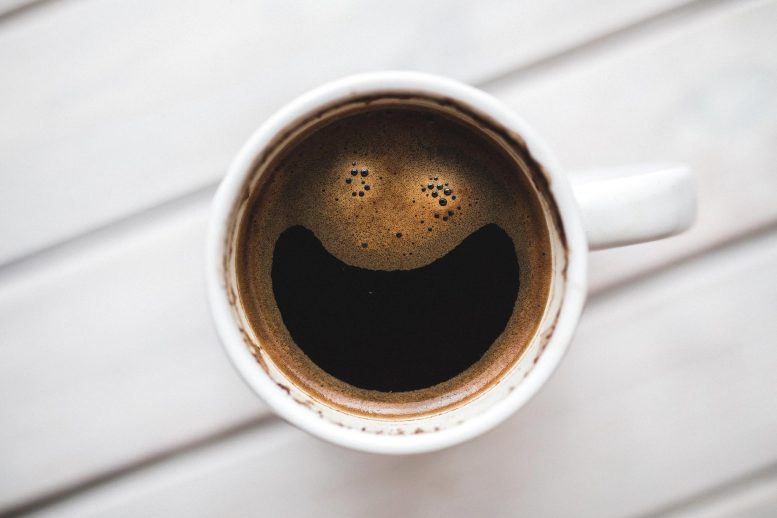
Researchers at Bielefeld University and the University of Warwick monitored the daily behavior and mood of young adults over a four-week period.
People who drink caffeine regularly tend to feel a noticeable lift in their mood after having coffee or another caffeinated beverage. According to a new study from Bielefeld University and the University of Warwick, published in Scientific Reports, this effect is especially strong in the morning compared with later in the day. Participants reported being happier and more energetic on mornings when they had consumed coffee compared with mornings at the same time when they had not.
The researchers also identified a connection between caffeine intake and reduced negative feelings such as sadness or irritability. However, these effects were weaker and, unlike the boost in positive emotions, did not vary depending on the time of day.
To carry out the study, the team observed 236 young adults in Germany over a period of up to four weeks. Participants filled out short surveys on their smartphones seven times each day, recording their mood and whether they had consumed a caffeinated drink within the previous 90 minutes. This approach allowed the researchers to capture the influence of caffeine in daily life rather than only in controlled laboratory experiments.
Perceived effect regardless of consumption habits
The researchers also investigated whether coffee has different effects on different individuals. Justin Hachenberger from the Bielefeld University in Germany says, “We were somewhat surprised to find no differences between individuals with varying levels of caffeine consumption or differing degrees of depressive symptoms, anxiety, or sleep problems. The links between caffeine intake and positive or negative emotions were fairly consistent across all groups.”
The researchers expected that people with higher levels of anxiety would experience negative mood changes, such as increased nervousness, after consuming caffeine. However, Hachenberger emphasizes that people who react to caffeine in a bad way may avoid it and that the study did not include people who completely abstain from caffeine.
Role of caffeine withdrawal symptoms remains unclear
The researchers explain the mood-boosting effect of caffeine on morning mood with its ability to block adenosine receptors, which promotes wakefulness and makes people feel more energetic. “Caffeine works by blocking adenosine receptors, which can increase dopamine activity in key brain regions—an effect that studies have linked to improved mood and greater alertness,” says Professor Anu Realo from the University of Warwick.
Yet, it remains unclear whether these effects are related to a reduction in withdrawal symptoms after a night’s sleep. “Even people with moderate caffeine consumption can experience mild withdrawal symptoms that disappear with the first cup of coffee or tea in the morning,” says Anu Realo.
Caffeine consumption: a universal habit
“Around 80 per cent of adults worldwide consume caffeinated beverages, and the use of such stimulating substances dates far back in human history,” says Professor Sakari Lemola from Bielefeld University, the study’s senior author. “Even wild animals consume caffeine; bees and bumblebees prefer nectar from plants that contain caffeine.”
Still, the study authors caution that caffeine can lead to dependence. Excessive intake is linked to various health risks, and consuming it later in the day can lead to sleep problems.
Reference: “The association of caffeine consumption with positive affect but not with negative affect changes across the day” by Justin Hachenberger, Yu-Mei Li, Anu Realo and Sakari Lemola, 5 August 2025, Scientific Reports.
DOI: 10.1038/s41598-025-14317-0
Never miss a breakthrough: Join the SciTechDaily newsletter.
4 Comments
Puh-leeze. This has nothing to do with coffee. It’s the caffeine!
You can get the same feel good, awake buzz with a cheap caffeine pill also. Available in almost any store. 200mg is the standard size, which is far too much for me as I am particularly sensitive to caffeine. so I cut the pills into quarters.
Caffeine is an alkaloid that stimulates nerves. Nicotine is an alkaloid that depresses them. Together, they keep you in balance and as Pavlov said, coffee is bad-habit glue–it glues bad habits together. Quit the excuses and break the addiction with more info how as News4Living. (wordpress. com)
Heroin too…for the already dependant.
Hi , coffee in some circles gets a bad rap.
Tea is my go to , black tea which in fact as I only learned is not black but a reddish color, darker depending on how strong you brew it.All the years I have been drinking tea and I never noticed , probably due to the fact adding milk as we do back in Dublin .
I do enjoy a good cup of coffee , specialty copies and different kinds of coffee drinks from all over the world I like to try them out or experiment with them at home.